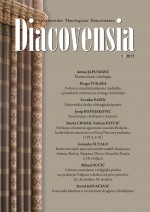Kontroverzijski spisi sjevernohrvatskih franjevaca Antuna Bačića, Stjepana Vilova i Emerika Pavića u 18. stoljeću
THE CONTROVERSIAL DOCUMENTS OF THE NORTHERN CROATIAN FRANCISCANS ANTUN BAČIĆ, STJEPAN VILOV AND EMERIK PAVIĆ IN THE 18TH CENTURY
Author(s): Goranka ŠutaloSubject(s): Christian Theology and Religion, 18th Century
Published by: Katolički bogoslovni fakultet u Đakovu
Keywords: controversial catechisms in the 18th century; Catholic religious truths; Orthodox religious contents; confessional identity and alterity; Franciscans Antun Bačić; Stjepan Vilov and Emerik Pavić;
Summary/Abstract: Using the imagological analytical method, based on controversial catechisms of the northern Croatian Franciscans (Bačić, Vilov, Pavić) from the 18th century, the paper addresses the phenomenon of constituting the confessional (Catholic) identity and (Orthodox) alterity as the central part of the issue. Therefore, the paper aims to clarify the confessional otherness through the analysis of the interrelationship of auto-images and hetero-images between Catholic and Orthodox Christians in the 18th century, primarily in Slavonia. The mentioned Franciscans, as members of the cultural circle of Buda (Budim), wrote works of theological controversy in the vernacular, which was an expression of particular theological interest among the (Slavonian) religious polemicists in the 18th century. During their pastoral work, all three Franciscans must have been in contact with Orthodox Christians, however, the target readers of the Franciscan controversial texts were not the Orthodox Christians but Catholics for whom such works were intended as a practical aid for religious dialogue with the Orthodox Christians. Therefore, it is not by accident that the northern Croatian Franciscans inserted controversial parts in their catechisms (although it is not their main purpose). Neither Bačić, nor Vilov, nor Pavić wrote true religious polemics, like those of the Jesuit written in Latin (Pejačević, Werntle, Šimunić) as well as Croatian (Kanižlić), but their catechisms are largely characterized and determined by controversial thematic/problematics. They are especially valuable because they are written in the vernacular, which is rare in the polemic genre of the 18th century, characterized by the grand style (Latin language), complex theological and church history themes, as well as orientation towards educated recipients. The catechisms of the above-mentioned Franciscans reveal a legacy of tendencies and preoccupations of the post-Tridentine era of the Catholic Reformation and are also a peculiar and important indicator of the direction of religious polemic literature within the scope of a wider context of literary culture of the 18th century Slavonia.
Journal: Diacovensia: teološki prilozi
- Issue Year: 25/2017
- Issue No: 1
- Page Range: 101-122
- Page Count: 22
- Language: Croatian

